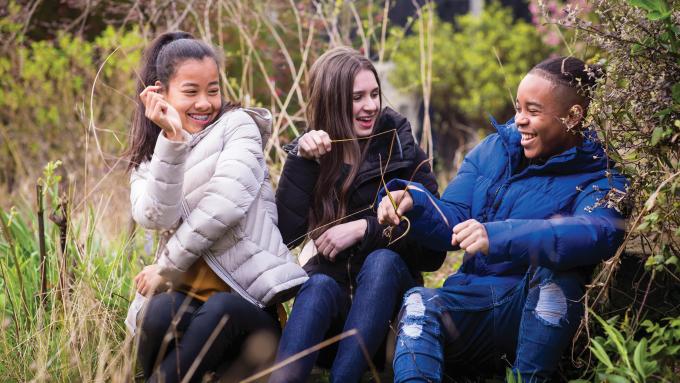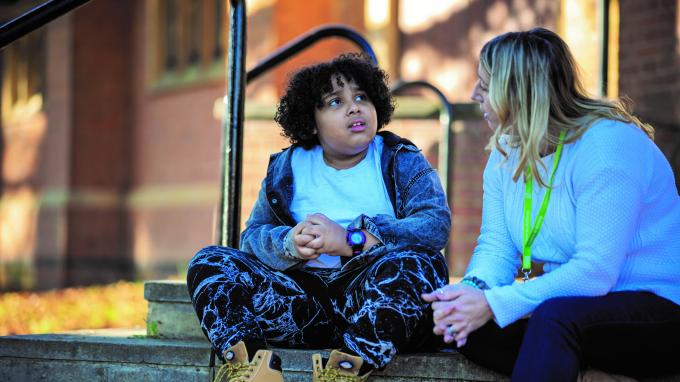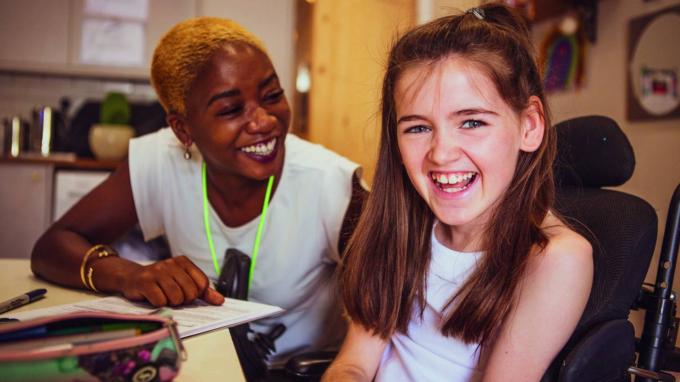This report examines the current evidence around the benefits of social prescribing for children and young people and brings it together with new research from Barnardo’s services.
The Missing Link: social prescribing for children and young people, demonstrates that social prescribing improves children and young people’s mental health and wellbeing and is cost effective. We are calling for a national strategy to ensure all children and young people have access to social prescribing, and to the community activities that support them.
What is social prescribing?
Social prescribing is a way of connecting people to activities, groups, and services that help improve their health and wellbeing (NHS, 2023). Examples of the type of support included as part social prescribing services include:
- group activities like crafting and cinema clubs to reduce loneliness
- walking groups to improve low activity levels and reduce the effect of long-term conditions
- outdoor activities and exercise including gardening or swimming to reduce anxiety and improve wellbeing (Indeed, 2023)
Social prescribing recognises that health and wellbeing is determined by social, economic, and environmental factors and that clinical interventions are not always appropriate in addressing people’s needs.
There are a range of social prescribing models, but all rely on strong relationships between services to ensure that social prescribing interventions work for the person at the centre. Increasingly, the role of the 'Link Worker' is being seen as key to assess the needs of an individual referred and to offer support, as well as creating their social prescription (NHS England, 2023). Link Workers spend time with children and young people to understand the problems affecting their health and wellbeing and set goals to support them. They then work with them and their families to help them engage with community activities including through making them feel confident enough to attend, providing transport and signposting to wider support.
Social prescribing for children and young people
[It] has been a huge help for me. My anxiety was awful, I wouldn’t leave the house or talk to people, my attendance was awful, I couldn’t bring myself to go in. It’s had such a positive impact on my life, I can do stuff now, my attendance picked up, I can go outside. [...] I never thought I’d come this far, from where I was to a college place.
Barnardo’s service user supported by the Cumbria LINK social prescribing service.
Benefits of social prescribing for children and young people
In comparison to adults, social prescribing for children and young people is underdeveloped with fewer services available. However, early evidence suggests that social prescribing is an effective preventative and early intervention service for children and young people with mild or non-clinical mental health problems (National Academy for Social Prescribing, 2023).
Increasing evidence suggests that the sorts of activities that can be socially prescribed, such as involvement in arts, music, social groups, physical activity and connecting more with nature benefits children and young people by:
- Improving young people's development, health and wellbeing (Cartwright et al, 2022)
- Has a positive impact on children's mental health and cognitive performance (Mccormick, 2017)
- Reduce the use of other primary care services which could save money for the state and have more benefits for wider society (Dayson and Bashir, 2014)
Social prescribing and Barnardo's
Barnardo’s delivers the largest voluntary sector social prescribing service for children and young people in England. The Cumbria LINK service has supported over 500 children and young people aged 5-19 years-old since March 2020. The service is funded by four Primary Care Networks (PCNs) with additional funding from Barnardo’s. The service was designed to respond to a growing need for children and young people’s mental health services in primary care.
We’ve also partnered with PCNs and an Integrated Care Board to produce a social prescribing service in Lancashire. The service is funded via local PCNs with a short term top up from the Integrated Care System.
Our social prescribing model is co-designed and produced with children and young people, working with local schools to ensure that service provision reflects local need. The service works with children and young people with a variety of complex needs.
The sessions with you have been incredible and have really helped me control my anxiety and help others with it too. I feel a lot better after speaking about it. Thank you for all your help.
Service user supported by a Barnardo's social prescribing service
Our recommendations
Based on current evidence and research from our social prescribing services we recommend a cross Government national strategy for children and young people’s social prescribing, working with stakeholders to take a strategic approach that includes:
- reforming social prescribing funding to include training and professional development for Link Workers, to cover management costs, and to support additional service costs not included in current models, including transport, premises and the additional support that Link Workers provide for children and young people
- working with stakeholders to develop referral criteria so that referrers in health, school and the wider community understand the role social prescribing can play in improving outcomes for children and young people
- development of outcome measures for children and young people that demonstrate the health, wellbeing, education and societal benefits of social prescribing as an example of personalised care
- support for Integrated Care Systems to provide funding for voluntary, faith and community organisations providing youth services that children and young people can be referred to as part of a social prescription
- a focus on ‘green' and 'blue’ social prescribing (where people connect with nature spaces like parks or waterways) as a key component of social prescribing and improving children and young people’s mental health outcomes

Three ways social prescribing helps children and young people
Read a blog by Becky Rice, Senior Policy Advisor on Mental Health and Wellbeing at Barnardo’s, on how social prescribing can help children and young people.

Our policy work
We call for improvements to the law, policy, and professional practice informed by the experiences of the children and young people we support and our own evidence-based research.

Commission us
As the UK’s largest children’s charity, and one of the most comprehensive providers of integrated health and social care services for children, young people and families, Barnardo’s provides support and services that better meet health and wellbeing needs and improve outcomes.

